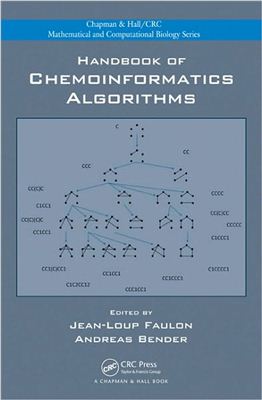Jean-Loup Faulon, Andreas Bender. Handbook of Chemoinformatics
Algorithms. Chapman and Hall/CRC, 2010. - 434 p. - ISBN: 1420082922
(Chapman & Hall/CRC Mathematical & Computational Biology)
Unlike in the related area of bioinformatics, few books currently exist that document the techniques, tools, and algorithms of chemoinformatics. Bringing together worldwide experts in the field, the Handbook of Chemoinformatics Algorithms provides an overview of the most common chemoinformatics algorithms in a single source.
After a historical perspective of the applications of algorithms and graph theory to chemical problems, the book presents algorithms for two-dimensional chemical structures and three-dimensional representations of molecules. It then focuses on molecular descriptors, virtual screening methods, and quantitative structure-activity relationship (QSAR) models, before introducing algorithms to enumerate and sample chemical structures. The book also covers computer-aided molecular design, reaction network generation, and open source software and database technologies. The remaining chapters describe techniques developed in the context of bioinformatics and computational biology and their potential applications to chemical problems.
This handbook presents a selection of algorithms relevant in practice, making the book useful to those working in the field. It offers an up-to-date account of many algorithmic aspects of chemoinformatics.
Unlike in the related area of bioinformatics, few books currently exist that document the techniques, tools, and algorithms of chemoinformatics. Bringing together worldwide experts in the field, the Handbook of Chemoinformatics Algorithms provides an overview of the most common chemoinformatics algorithms in a single source.
After a historical perspective of the applications of algorithms and graph theory to chemical problems, the book presents algorithms for two-dimensional chemical structures and three-dimensional representations of molecules. It then focuses on molecular descriptors, virtual screening methods, and quantitative structure-activity relationship (QSAR) models, before introducing algorithms to enumerate and sample chemical structures. The book also covers computer-aided molecular design, reaction network generation, and open source software and database technologies. The remaining chapters describe techniques developed in the context of bioinformatics and computational biology and their potential applications to chemical problems.
This handbook presents a selection of algorithms relevant in practice, making the book useful to those working in the field. It offers an up-to-date account of many algorithmic aspects of chemoinformatics.

